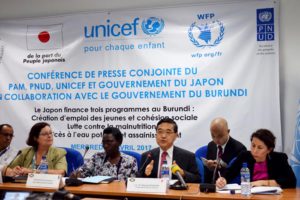In March 2017, the Japanese government granted US $ 2,837,000 financial support to three UN agencies (UNDP-UNICEF-WFP) to be used in youth employment, water and sanitation as well as fight against malnutrition.

Takayuki Miyashita (in the middle), Japanese Ambassador to Burundi in a joint press conference with three UN agencies (UNDP, WFP and UNICEF)
Nicole Jacquet, the Deputy Country Director of the World Food Program, says Cankuzo eastern Province, has the highest rates of food insecurity and chronic malnutrition in Burundi estimated at 56.4% and 57%, respectively. “The acute malnutrition rate is also among the highest rates with a prevalence of about 17% in that province”, she says.
With the Japanese financial contribution, the WFP is considering providing nutritional assistance to 29,000 children under five and 4,200 pregnant and lactating women. This project aims to contribute to the reduction of mortality and morbidity due to malnutrition.
“The funding of $ 1.466 million is used for 33,200 cases of moderate acute malnutrition expected in Cankuzo province and to implement a community-based malnutrition prevention system”, says Nicole Jacquet.
Malnutrition and poor hygiene to infant and child diseases are preventable, according to M. BO. Viktor Nylund, UNICEF representative in Burundi.
“UNICEF expects in 2017 that amongst children under 5, some 50,000 children will need treatment because of severe acute malnutrition in Burundi”, he says. He also says these malnourished children need adequate treatment and psycho-social support.
For this project, the Japanese government has granted US $ 636,000 to UNICEF Burundi for interventions in child survival in Burundi. About 115,000 people will benefit from drinking water and adequate sanitation.
The UNDP received US $ 741, 000 for 900 young women and men to create small enterprises and contribute to the community development.
“Social stability in the region is one of the priorities of Japanese government, which has decided to provide support to the vulnerable youth of Burundi”, says Takayuki Miyashita, Ambassador of Japan to Burundi.
Japan’s development cooperation with Burundi started in the 1970s. Since then, Japan has provided more than US $ 300 million to assist Burundi, particularly directed to transport, agriculture and basic social services, including education and health care.


















 IWACU Open Data
IWACU Open Data

